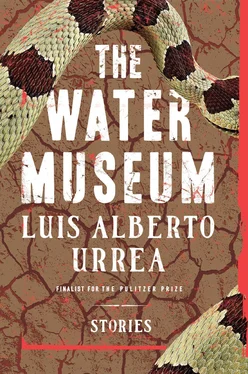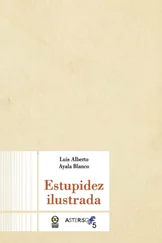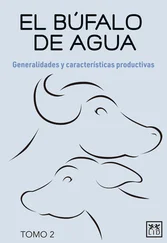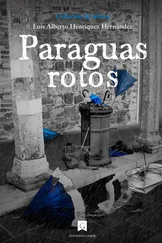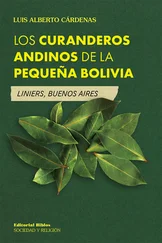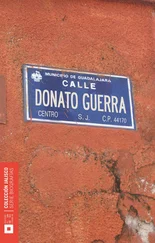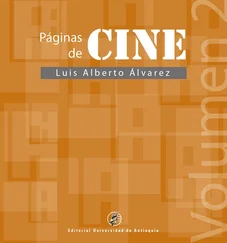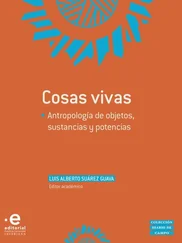Across the sloughs, the little slaughterhouse almost looked nostalgic. Occasional tides of blood and offal still pulsed out of there, making the sloughs stink worse than usual. It looked like the blood wasn’t flowing that morning.
They heaved the canoe into the sludge that passed for water, and it hit with a flat smack. Shadow had to push it with his foot, hopping along until it seemed like it was bobbing. They watched to see if it would sink.
“There you go!” Shadow said. “Hop in!”
He steadied it, and Junior climbed in. Then Shadow climbed in. Their weight sank the bottom of the canoe into the muck and they sat there, moored like a commemorative statue of two idiots setting out for an adventure.
“Okay,” said Shadow. “So we ain’t Lewis and Clark.”
They got out. The rancid blood-mud released the canoe with great sucking reluctance. They portaged it around the hill to the busted end of Half-Hill Road. The water there was almost four feet deep. They put in again and found themselves floating.
“Holy shit!” cried Shadow.
It took them a few minutes to coordinate their oarsmanship, but they finally made forward motion after a little floundering. Junior was in front and Shadow squatted in back. They moved down one of the braided waterways, scraping between crumbling humps of weeds and mud. A green crab threatened Shadow from one black bank. Junior looked down into the water. He could see rainbows of pollution and oil on the surface, and weird billows of yellow and green filth that rose from the gray bottom like small poisoned geysers.
They maneuvered around a slime-covered shopping cart. Junior pointed out a washing machine in the water. Corduroy pants on a hillock, brittle after years in the sun. They squeezed through a narrow passage and were startled to find themselves in a bigger stream. A heron raised its head and regarded them with disdain.
“Big fuckin’ bird!” Shadow shouted.
The heron raised its wings and left the earth in slow motion and hove upstream.
“What’s that?” Junior said, leaning over.
“That’s like,” Shadow said, “that’s like freakin’ shrimps down there!”
They watched evil-looking white crustaceans scuttle out from under the shadow of their boat.
“Dude,” said Junior. “That’s totally awesome.”
“No disrespect or nothin’,” Shadow replied, “but you’re talkin’ like a white boy. You a vato or a gabacho?”
They paddled down to the railroad bridge, ducked their heads, and made their way under it, horrified by the vast networks of spiderwebs under there. A baseball cap floated in an eddy. “Because,” Shadow said, “you got to be something. If you ain’t something, you’re nothing. That’s a fact.”
They kept cutting south as they paddled west. They went into the darkness under I-5, where they could hear the whoosh of the cars overhead, the thrum when trucks went by. The whole bridge clanged and clicked. When they busted out of the shadows, close to the southern bank, they could see broken old buildings. White birds standing in the water. Bright yellow flowers formed a fluorescent haze on the bank.
“That’s mustard,” Shadow said.
“No way.”
“Yes sir! Mustards come from, like, flowers. You didn’t know that?”
Shadow Boone, Barrio Naturalist.
Junior looked down.
“Fish!” he cried.
“Oh shit!”
Under the boat there was a little swirl of curious sunfish.
“Check it out,” Shadow said. He dangled a finger in the water and wiggled it. Several of the fish rushed over and tried to nibble it. This delighted Shadow, and he insisted on playing this game with the fish, even though his antics threatened to capsize the canoe. Junior waited him out, and after a while they resumed paddling. “I’ma come back as a fish when I die,” Shadow said. “I’ma be a big fat catfish. How about you, peewee?”
“I’m not coming back,” said Junior.
Shadow paddled.
“That’s deep,” he finally said.
They were going far now. They couldn’t even see the hill anymore. Total silence. Junior looked up on the bank. Bushes and planks and boxes and a lean-to.
“Shadow,” he said. “Check it out.”
As they floated by, carried now by the current, they saw faces staring out at them from the bushes. Gaunt, haunted faces. Silent Mexican men hiding from the Border Patrol. Waiting for night. One raised his hand in a silent greeting.
Shadow and Junior dug in with their paddles and moved downstream.
They paddled past a wrecked car sitting beneath a bare tree. Chickens scratched around the chassis. Suddenly, they broke out into an even bigger body of water. To the south, they saw the skeletal towers of the power station.
“The sea!” shouted Shadow.
“That’s not the sea,” said Junior. “This is the cooling pond. Big Ángel used to go fishing here.”
They let the canoe drift while they ate their sandwiches.
A sea turtle broke the surface of the water and blew air at them.
“Jesus Christ!” shouted Shadow.
Junior had heard about this — the turtles congregated around the power station, enjoying the warm water. He was about to tell Shadow all about it when a Border Patrol helicopter roared overhead, made a sharp turn, and swooped down upon them.
* * *
White trucks skidded to a stop on the banks and bullhorns commanded them to beach the canoe. Shadow was mouthing off before he even got out of the boat. “Fuckin’ racists! I’m an American citizen! That’s right! That’s right! You can’t do shit to me, gringos cabrones! I am USA all the way!” he raised his fists. “USA, all the way! USA, all the way!”
But it turned out he wasn’t USA all the way at all. When the Border Patrol agents got them to the station, they discovered that Shadow García was illegal. He’d been born in Tijuana and his parents had snuck him over the border as an infant. He’d been in the USA illegally all this time and never knew it.
“But I ain’t no Mexican,” he said. “I’m a Chicano. I’m a Dodgers fan.”
He and his family vanished that night. Junior never saw Shadow again. He sat through “Mr. Hitler’s” endless droning lectures, taking notes for those failures, Chango and Little Ángel. But he never did read Louie and Clark. And he never again went downhill to the gravel lot.
Shadow wasn’t the kind of guy who sent postcards. And sooner or later everyone forgot all about him. And Junior never mentioned him again. He never did find out what happened to that pinche canoe.
Three. The National City Reparation Society
It wasn’t like Junior only hung with white people now. But he didn’t see much Raza, he’d be the first to admit. Not socially. That’s why you leave home, right? Shake off the dark.
As soon as he picked up the clamoring cell phone, he had that old traditional homecoming feeling: Why’d I answer this? He didn’t recognize the number — some old So Cal digits. He stared at the screen for a moment, as if it would offer him further clues.
An accented voice said:
“Hey, bitch.”
“Excuse me?”
“Said: Hey. Bitch. You deaf, homes?”
“You must have the wrong number,” Junior said, about to click off. Homes, he said to himself. What is this, nineteen eighty-six?
“Junior!” the guy shouted. He used the old hectoring fake-Beaner accent the vatos had affected when mocking him in school: WHO-nyurr! “I bet you got some emo shit for a ringtone. Right? Like ‘The Black Parade,’ some shit like that.” The guy laughed.
“I’ve been talking to you for, like, one and a half minutes, and you already insulted me. I don’t even know who you are.” He knew who it was — he just didn’t want to talk to him.
Читать дальше
